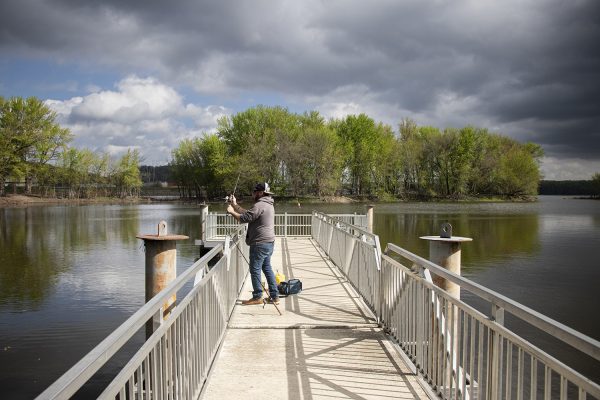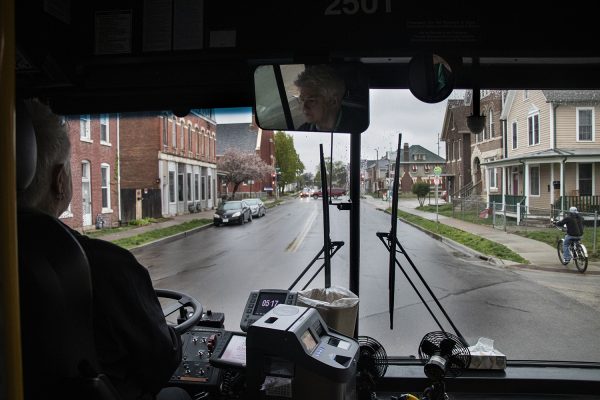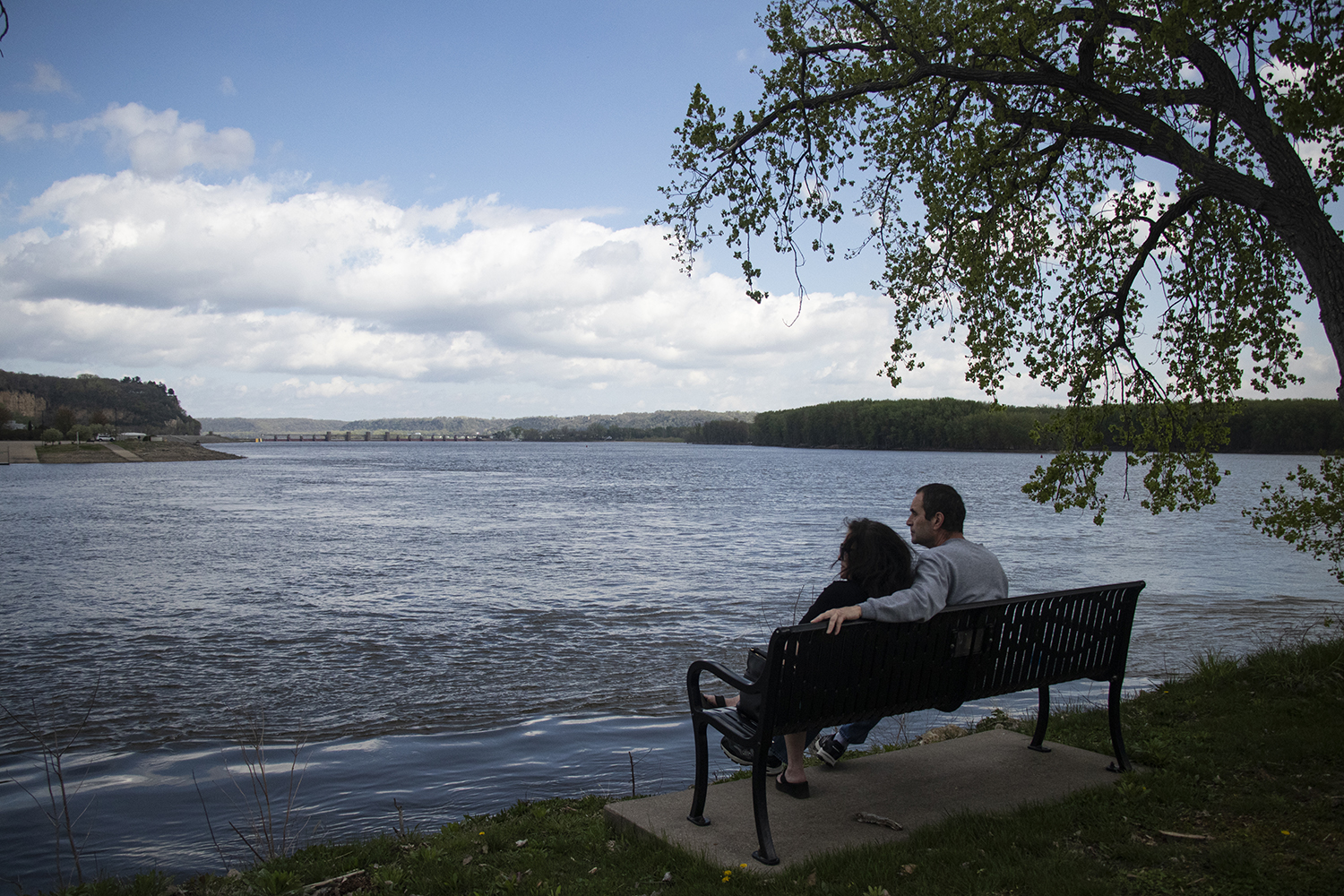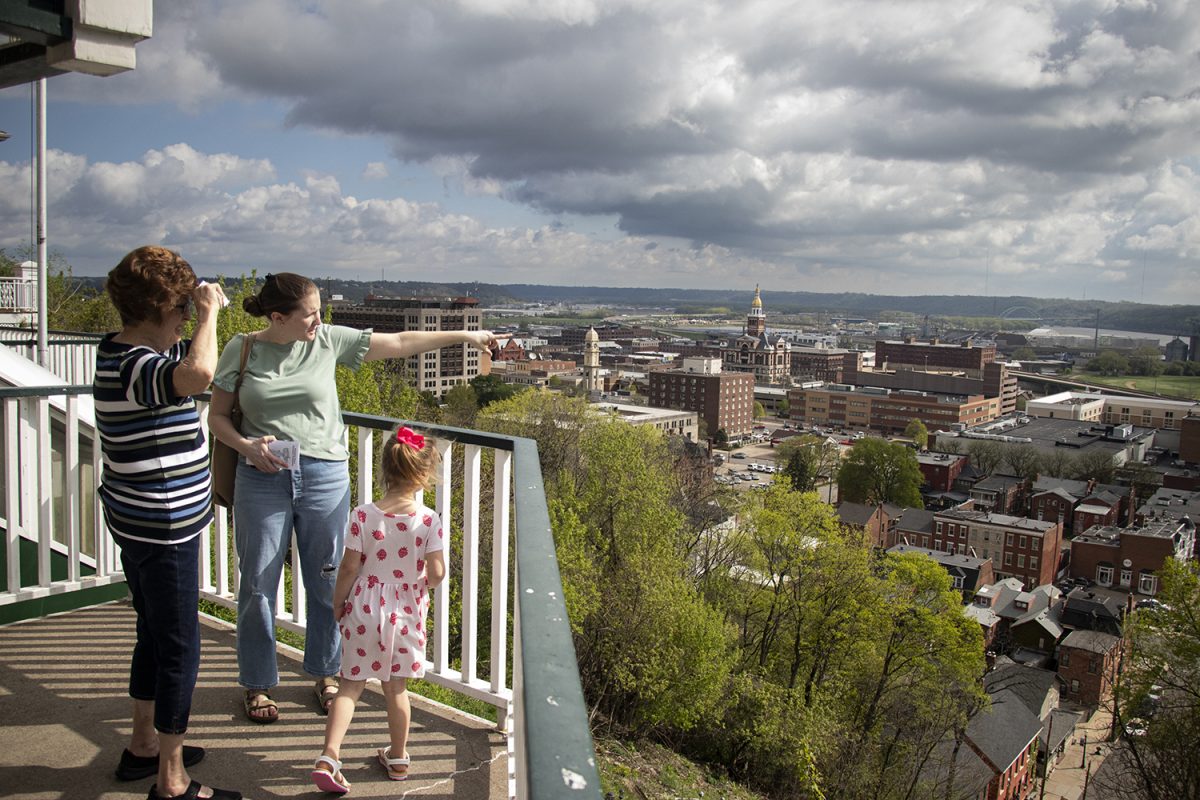Along the shore of the Mississippi River lies the city of Dubuque, Iowa — a city of unique architecture, remarkable wildlife, and preserved historical and cultural landmarks. However, underneath all the features of the city lies a common goal for small businesses and large corporations alike: sustainability.
The University of Iowa School of Journalism and Mass Communication partnered with the Iowa Initiative for Sustainable Communities in early 2024 on a project that benefited both the environmental issues close to home in Dubuque and the young reporters, photographers, and strategic communication specialists at the UI.
Alex Scott, UI assistant professor of multimedia storytelling, collaborated with the Iowa Initiative for Sustainable Communities to bring his capstone photojournalism course to Dubuque to gain real-world experience working for the Dubuque Telegraph Herald.
“The experience was absolutely wonderful,” Scott said. “I think it was very educational, and we had a lot of fun exploring the city, doing the things that journalists have to learn to do. The students really took the initiative. They went out there and did everything that was asked of them and a whole lot more to make sure that we really delivered on the coverage for these 30 stories that were going to go into the paper.”
The joint efforts between the Iowa Initiative for Sustainable Communities and the UI provided experiential learning opportunities for the students, allowing them to gain real-world experience in the fields they’re pursuing rather than just sitting in a classroom.
“I think it really allowed students to partner with an actual publication and get published for the first time,” Scott said. “It was just a really good experience for them to get real-world experiences in a little bit of a less intense format.”

The workshop, centered around sustainability initiatives in Dubuque, combined the students’ work with the work already being done by the community. Students in different departments worked together as reporters, photographers, and strategic communicators to improve awareness of sustainable projects in Dubuque.
“This workshop was all about sustainability,” Scott said. “And so, for the first time, the students got to do solutions-oriented journalism. It was really important for practical experience, and for broadening our horizons on what good journalism is. Sometimes it’s not just the problem, it’s how people are reacting to the problem and trying to find solutions.”
Kylah Hedding, assistant professor at the UI School of Journalism and Mass Communications, described the importance of the experience for students and how giving them these opportunities benefits their learning.
“What we try to do with the capstone courses is give the students a real-world experience, and this program was just a really big hit,” Hedding said. “I think students really enjoy any time they feel like the stuff they’re doing in class is actually going to have a material effect.”
Capstone courses are advanced classes required for students. In the School of Journalism and Mass Communication at the UI, these can vary in field based on the focuses students have within their majors.
“We really do, particularly in upper-level classes, try to focus on experiential learning for students who maybe can’t quite take on an internship,” Scott said. “Environment and sustainability issues seemed to be a topic a lot of the students were interested in, so being able to focus on that and gain experience in the field was a win-win.”
Experiential opportunities like the one in Dubuque give students preparation and experience for their careers beyond college education, helping in another field of learning that can’t be taught in a classroom.
“One of the main things that the School of Journalism and Mass Communication does is to increase the amount of experiential learning that students have,” Scott said. “We’re really trying to find a lot of ways to get students out of the classroom, to network professionally, and to do work that is meaningful and that’s going to teach them a lot of things.”
RELATED: A look at the UI’s plan for a new School of Earth, Environment, and Sustainability
Joshua Rihner, a UI fourth-year student who went to Dubuque specializing in strategic communications, felt the experience gave him a better understanding of what his field really does and how it can be applied to important issues such as sustainability.

“I think the thing I learned that was most valuable to me was the collaboration with all the teams going to Dubuque. We worked in concert with the photography team and reporters,” Rihner said. “It was really interesting to hone in on that specific population to try and figure out how the city could connect on an issue like sustainability.”
Issues such as sustainability are already important in the minds of younger generations. Students such as Rihner feel a responsibility to take action in their own ways. Rihner’s focus on small businesses and housing throughout the capstone project was an influential opportunity, as he worked closely with the Office of Shared Prosperity and Neighborhood Support in Dubuque.
“It was so nice to get their perspective. A lot of us had only been to Dubuque once or twice, but we hadn’t actually lived there, so it was nice to get a perspective of someone that was really embedded in the community,” Rihner said.
Scott emphasized the reality of sustainability and how it has become a hot topic for young people in a world where climate change is surging.
“This is a younger generation that is dealing with global issues with regards to climate change, and sustainability should be on the top of everybody’s minds right now,” he said. “As journalism students, I think it really helps expand the idea of what types of stories can be productive and impactful for our audiences. Doing something with all the sustainability initiatives for a community can connect people together who want to make the world a little bit more of a sustainable place.”
Cities like Dubuque are doing the necessary work to move forward with sustainability projects like the ones on which the capstone students collaborated on.
“Sustainability is such an interesting topic because it’s so broad,” Scott said. “There’s a broad range of potential story ideas, and I would be really excited to collaborate on it again. We’ve even talked about changing from city to city that have these sort of sustainability initiatives. These are the initiatives that people believe in that need good communication employees to get the message out.”
The Telegraph Herald published the newspaper insert with the articles and photos from the School of Journalism and Mass Communication students contributed in June. The coverage can be accessed here.




